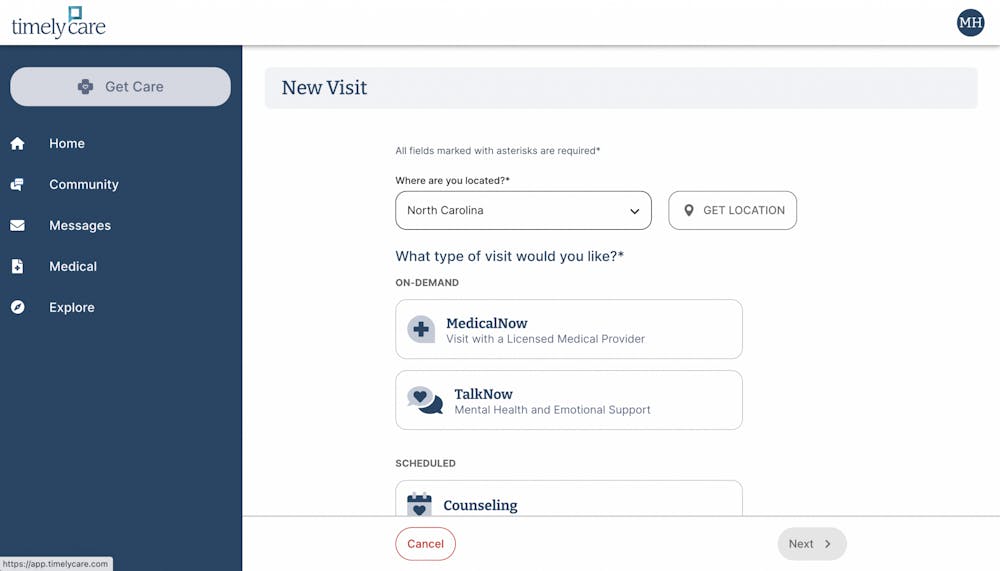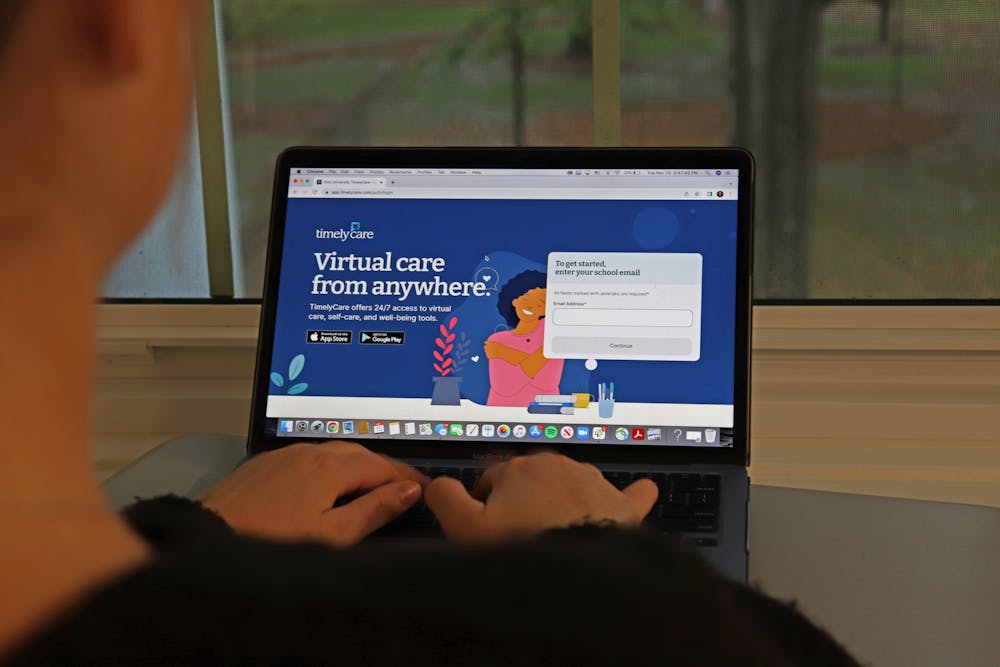“Hey everyone. It took me a while to understand that I need to seek help. These past few weeks I’ve been stressing about financial aid, family back at home, being homesick and trying to understand that not everyone is going to want to be friends. It’s hard to feel welcomed when people give you looks or they act like you’re not there. I feel both invisible and out of place. I want to tell my friends, but I don’t want to put a burden on their shoulders. What can I do to relieve this stress?”An anonymous user of the initials IB posted on TimelyCare’s “Community” feature seeking relief and support.
Partnered with colleges and universities across the country, TimelyCare aims to deliver virtual solutions to mental health and medical care issues for all students. The “Community” feature includes a chat service in which users can post anonymously about their thoughts, feelings and concerns. Their comments are visible and open to feedback to all those registered for TimelyCare.
“I am the same way. It’s really hard for me to ask for help. But trust me your friends want to know how you’re doing and they will want to help! You won’t burden them. They care about you,” MB responded to IB.
“Hi! :) Do not worry about how other people see you, because they are probably thinking the same thing too and are rushing to get wherever they need to go. I may just be a tiny voice, but you are never a burden, and you are never alone. A great stress reliever for me is meditation and journaling! If you ever need a friend to talk to about anything, I’m here for you!” MM also replied to IB.
Elon’s partnership with TimelyCare comes in tandem with the launch of the HealthEU initiative — an integrated brand and hub of resources that looks at how to best help students, faculty and staff with their mental health, medical care and wellness needs.
TimelyCare’s full services have been open, free of charge, to Elon University students since the fall 2022 semester, according to Dean of Students Jana Lynn Patterson.
“We did a really hard look at things like capacity around urgent care in the area, and if a student got sick outside the areas of student health or needed to talk to someone to engage in a counseling relationship outside of counseling services hours, there were just not a lot of options for our students,” Patterson said. “And if there were, they required that our students be able to pay for them.”
TimelyCare
With TimelyCare, students also get access to 24/7 on-demand mental health support, scheduled virtual appointments with certified health coaches, licensed counselors, psychiatry services by referral and self-care content such as yoga, meditation, sleep tips and healthy relationship advice.
Students are able to use their Elon login to access TimelyCare’s website, where they can schedule appointments and access on-demand care. TalkNow is the platform’s on-demand mental health service. According to Mallory Olson, a media relations manager at TimelyMD, the average wait time for Elon students to connect with a provider for TalkNow is four minutes.
Seli Fakorzi is the director of mental health operations for TimelyMD and a licensed clinician who works directly with students. She said that the goal for TalkNow counselors is to work with the student to create a comprehensive “care plan” for them to follow. TalkNow sessions can last up to 30 minutes and are intended for in-the-moment student support.
“Students are able to understand what is the plan, what are the next steps,” Fakorzi said. “And then also understand if it’s an isolated event, or scheduled counseling is not the next step for them, that they can also reach back out to our service anytime they would like to.”

TalkNow matches students with the next available counselor, but TimelyCare’s scheduled counseling appointments allow students to choose their provider. Elon students are able to schedule 12, free virtual counseling appointments each year through TimelyCare. Students can either schedule appointments with the same counselor or with different counselors each time.
“Every provider has a bio where you can see a photo of the person, their name, their credentials and information about their areas of specialty,” Abby Waldron, a senior client success manager for TimelyMD, said. “We make all of that information readily available to students so that they can find someone that they feel comfortable with.”
According to Fakorzi, students are also able to contact TimelyCare’s Customer Care Navigation Team, which allows students to enter what they are looking for in a provider and receive assistance in finding a match from TimelyCare staff.
Expanding and adapting
As TimelyMD continues to establish and expand its partnerships with colleges and universities across the country, more and more students have access to their services. According to Fakorzi, during the COVID-19 pandemic, TimelyCare saw a significant increase in students using its services.
“We’re the only virtual health solution focused exclusively on higher education,” Waldron said. “Currently we serve more than 1.5 million students at nearly 250 college and university campuses nationwide.”
According to Olson, TimelyCare is on track to reach 500,000 appointments across the platform’s services by the end of the fall semester.
“Demand for our services has never been higher,” Olson said. “So far this fall, students have accessed mental health and well-being services through TimelyCare more than 325,000 times.”
According to Cara Plasencia, associate director of Elon’s Counseling Services, Counseling Services has provided over 1,300 appointments to roughly 500 different clients since August 2022.
Yet, both Plasencia and Fakorzi said neither Elon’s Counseling Services nor TimelyCare are designed for long-term mental health care and emphasized the importance of working directly with students to create long-term plans and support systems.
“Counseling Services can also help a student get connected to a long-term provider in the surrounding community,” Plasencia wrote in an email to Elon News Network. “Students can work directly with their counselor, or request a care coordination appointment with our Counselor/Referral Coordinator for assistance when seeking long-term care or specialized care that we are not able to offer in-house.”
Sophomore Jasmine Walker has scheduled appointments with both TimelyCare and Elon’s Counseling Services since she started attending Elon.
Walker said that she preferred TimelyCare over Elon’s Counseling Services because of the accessible nature of the platform. The virtual appointments meant she could attend appointments from a more comfortable setting, which she said allowed her to feel less anxious and more comfortable opening up.
Junior Samantha Pomerantz said she has had the opportunity to utilize some of TimelyCare’s resources, and believes it is very beneficial for the future of mental health services.
“I think it’s been amazing,” Pomerantz said. “In my experience, I think TimelyCare is a great asset. … It’s definitely easier to connect with people about mental health.”
While she said she prefers in-person counseling sessions, as well as in-person spaces such as the meditations rooms located in the Truitt Center, Pomerantz does value the benefit of telehealth resources — especially for students who are not on campus.
“I think I do prefer to do in-person sessions, but when leaving the state for school, virtual could be beneficial in terms of staying with the same provider,” Pomerantz said. “I did virtual and in-person with the same person during COVID.”
According to Patterson, Elon law students are a great example of working through distance barriers, as they are located in Greensboro. Although not possible previously, Elon has increased the ability to engage students that weren’t easily reachable or accessible before.
While senior Maggie Bickerstaffe said she agrees with Pomerantz and prefers in-person sessions, TimelyCare is critical both for students in other locations and for students who cannot afford to wait once a month for an appointment.
“I do know a lot of people who tried to get in to see someone before, and there was like a huge waitlist where they couldn’t get in for like a month even,” Bickerstaffe said. “So it has definitely helped with that.”
Navigating
Despite the large number of students logging in for appointments, TimelyMD continues to meet the demand, according to Olson.
“Our blended care model of providers helps us adjust to student needs while maintaining timely access to care, diversity of providers and quality of care,” Olson said.
Yet, TimelyCare is not the only option for Elon students seeking counseling services.
Elon’s Counseling Services include individual counseling, group and couples counseling, support groups and referral support. Students are able to schedule appointments online with one of Elon’s nine clinicians. Appointments are only available 8 a.m. to 5 p.m. on weekdays; however, students who need support outside of those hours are still able to connect with an Elon crisis counselor. Similar to TalkNow, students are also able to call (336) 278-2222 to connect with an on-call counselor at any time.
Plasencia said access to counseling is important to student success at Elon.
“It’s important for students to have access to counseling and support to help them reach their goals and be successful during their time at Elon,” Plasencia wrote. “Mental health concerns among young adults has been on a continuous climb for several years, and it is important that our university provides access to support mental wellbeing on our campus.”
Patterson also said that the university is partnered with both the Jed Foundation, a non-profit, national organization dedicated to protecting mental and emotional health, and Alamance Psychiatric Associates, where the university is working with local hospitals to receive expedited services. What normally would be a four to six week wait for psychiatry care, is now a one to two week wait for Elon students.
As part of the Jed partnership, the university undergoes a three-year review and feedback process — which Elon began just before the COVID-19 pandemic.
“One of their recommendations was ‘You’re doing all kinds of great things, but people can’t find it,’” Patterson said. “The next piece of HealthEU is really going to be a collaborative effort across the university about thinking about integrated health and well being.”
Patterson said she has been at Elon since 1986 and has been involved in student health and mental health services right from the start. According to Patterson, the university’s use of technology over the years has had a lot to do with the era of and events occurring around the world.
“We had some students who said, ‘Would you ever think about virtual services?’ And we thought ‘Well, that’s not really our model, you know, we’re in person,’” Patterson said. “Well guess what, in March 2020, we had to go flip to virtual services. … When COVID forced us to do that, and people did it well, and our students responded positively to it — then it was a shift for us institutionally.”
While she said she doesn’t believe virtual and remote resources will completely replace in-person ones, Patterson said technology has done wonders for keeping students grounded and connected to each other.
“They see this as probably what the wave of their future is gonna be,” Patterson said. “Once they graduate from Elon, many of our students are working remotely so they’re engaging in virtual services. I do think that as we continue to work virtually and remotely, we’ve got to continue to develop ways to have connections with people. And sometimes that’s going to be virtually.”


